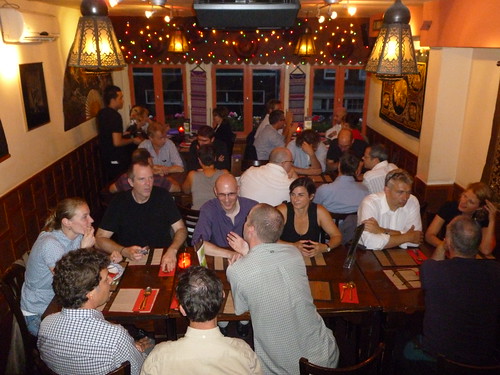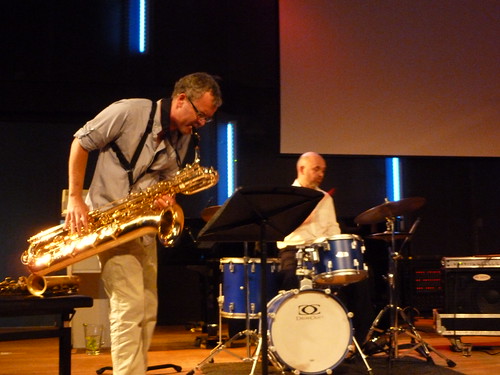The fourth Rhythm Changes conference: Jazz Utopia will take place at Birmingham City University in the United Kingdom from 14 to 17 April 2016.
Keynote Speakers
Professor Ingrid Monson (Harvard University)
Professor Raymond MacDonald (University of Edinburgh)
We invite paper submissions for Jazz Utopia, a four-day multi-disciplinary conference that brings together leading researchers across the arts and humanities. The event will feature academic papers, panels and poster sessions alongside an exciting programme of concerts delivered in partnership with the Birmingham Conservatoire and Jazzlines.
Jazz has long been a subject for utopian longing and hopes for a better future; it has also been the focus of deeply engrained cultural fears, visions of suffering and dystopian fantasies. In its urgency and presence jazz is now here. As improvisational and transitory, jazz is nowhere. Utopia is nowhere and now here. Jazz is utopia. Or: jazz is utopian desire. Jazz Utopia seeks to critically explore how the idea of utopia has shaped, and continues to shape, debates about jazz. We welcome papers that address the conference theme from multiple perspectives, including cultural studies, musicology, cultural theory, music analysis, jazz history, media studies, and practice-based research. Within the general theme of Jazz Utopia, we have identified three sub-themes. Please clearly identify which theme you are speaking to in your proposal.
 Jazz identities
Jazz identities
Claims have always been made for jazz as a certain utopian practice, in which jazz has made possible a musical-social space where different, usually marginal, identities are expressed and confirmed. At the multiracial club, bandstand, or dance-floor race and ethnicity are acknowledged, difference is championed or erased. Musicians have used jazz to step out of their class. The dialogic qualities and queer sounds alike of jazz offer opportunity for the expression of gender and sexuality. New thinking around disability and music reads jazz as a crip-space. Equally, consider the way in which freedom in improvisation has been understood as a liberating utopian practice. Even in its diasporic invention jazz comes from a kind of no-place (ou-topia = no place). In utopia, jazz is the effort to sound another world into being, the only condition of which is that it must be better. Has jazz really been that good?
Inside / outside: jazz and its others
What does jazz mean to its community of insiders and those that approach it from outside? For those who are deeply involved with jazz, whether musicians, critics, scholars, or fans, the genre often provides a utopian space for creative encounters. By definition, the articulation of this space through performance, writing, research and consumption also creates a community of outsiders who may seek ways to engage with the jazz community or observe it from afar. This strand invites papers that address the relationships between jazz and its “others”, defined in relation to music making, criticism, scholarship or reception, whether these interactions are antagonistic or collaborative in tone.
Heritage and archiving
This strand focuses on the different ways in which heritage practices and archival work contribute to the reconfiguration of jazz as a utopian space. Through its commitment to alternative ways of living and being, jazz offers imaginative variations on themes of history and preservation. It creates communities of collectors and music lovers, who refigure jazz as nostalgia and escape, as well as renewal and return. We welcome papers that explore all aspects of archiving practice and cultural heritage and the opportunities and tensions that present themselves for scholars, institutions and practitioners in these fields.
Proposals are invited for:
- Individual papers(20 minutes) – up to 350 words.
- Themed paper sessions of three individual (20 minute) papers – 350 words per paper plus 350 words outlining the rationale for the session.
- Seventy-five minute sessions in innovative formats – up to 1000 words outlining the form and content of the sessions.
Please submit proposals (including a short biography and institutional affiliation) by email in a word document attachment to: jazzutopia@bcu.ac.uk
The deadline for proposals is 1st September 2015; outcomes will be communicated to authors by 1st October 2015. All paper submissions will be considered by the conference committee: Christa Bruckner-Haring (University of Music & Performing Arts, Graz), Nicholas Gebhardt (chair; BCU), George McKay (University of East Anglia), Loes Rusch (University of Amsterdam/BCU), Catherine Tackley (Open University), Walter van de Leur (University of Amsterdam/Amsterdam Conservatory) and Tony Whyton (University of Salford).
The conference builds on the legacy of the Rhythm Changes research project. Rhythm Changes: Jazz Cultures and European Identities was funded as part of the Humanities in the European Research Area (HERA) Joint Research Programme, which ran from 2010-2013. The project team continues to develop networking opportunities and champion collaborative research into transnational jazz studies.
Updates on the conference and information about travel and accommodation will be available on this site over the next few months.
 A group of us from across Europe are meeting today to look back on the previous three Rhythm Changes conferences (Amsterdam 2012, Salford 2013, Amsterdam 2014) and to plan for our next conference in 2016 at, as we announced in Amsterdam last September,
A group of us from across Europe are meeting today to look back on the previous three Rhythm Changes conferences (Amsterdam 2012, Salford 2013, Amsterdam 2014) and to plan for our next conference in 2016 at, as we announced in Amsterdam last September,



 The cross-disciplinary event will be the largest jazz research conference ever hosted, featuring c.90 presentations across a four-day period. The Conference will kick off with a reception at The CUBE gallery in Manchester on Thursday 11 April which showcases Paul Floyd Blake’s Rhythm Changes photography exhibition.
The cross-disciplinary event will be the largest jazz research conference ever hosted, featuring c.90 presentations across a four-day period. The Conference will kick off with a reception at The CUBE gallery in Manchester on Thursday 11 April which showcases Paul Floyd Blake’s Rhythm Changes photography exhibition.
